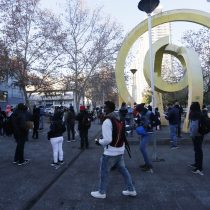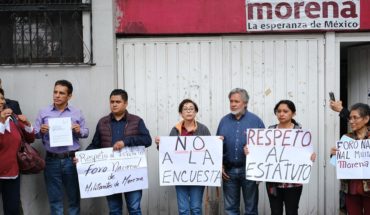
Words with marked negative connotation such as “danger”, “crime” or “threat to the stability of Chile” have been used repeatedly by the Government and its authorities when referring to immigrants. This charged approach is mostly picked up by TV, reinforcing through headlines of dubious objectivity, a potentially harmful feeling: “Foreign prisoner dedicated to micro-trafficking” – it is claimed – as if those arrested for that cause were preferably foreign or something that the connationals do not do at all.
That is why it is so important to know and commit to a perspective of respect for human rights, which are intrinsic, without exception; not only when it is appropriate or pleasing to do so, but in a much deeper sense: the recognition of the other as a person, whose rights must be respected, and thus their dignity, for their own human condition.
A week ago, lawyer Francisco Cox presented a report commissioned by the UN Human Rights Council on the venezuelan case, and in an interview on Channel 13 he emphasized that “the grace of HRDs is that they defend themselves independently of political color”, because of their universal and imprescriptibility character, so they should not be used as a political tactic at the convenience of parties. He also warned that living in a democratic regime did not guarantee respect for HRDs themselves, because “all regimes operating under the idea of moral superiority tend to invade, cross boundaries, finance coups, etc., and all of that brings back very bad memories.”
As we know Chile has acceded several decades ago to the Universal Declaration of HRDs, in addition to other pacts and treaties of the same order and, therefore, our country recognizes that “everyone has the rights and freedoms proclaimed in (that) Declaration, without distinction of race, color, sex, language, religion, political or other opinion, national or social origin , economic position, birth or any other condition”, (art. 2o). This means that all signatory States undertook to take action “to the maximum of the resources available to them, to progressively achieve, by all appropriate means, including in articulating the adoption of legislative measures, the full effectiveness of the rights recognized herein”.
Moreover, it is established within the HRD treaties that Chile has ratified that everyone has the right to health and well-being, food, housing, education, work and other rights considered basic to life. And most particularly,
equality before the law. This means, among other things, not being arbitrarily detained or prosecuted, the right to the presumption of innocence, in addition to the right to be heard by independent and impartial courts.
But how much is equality and dignity respected when it comes to immigrants? Apparently in recent years, in our country, little. We have witnessed how, in particular, the Undersecretariat Interior – on which much of the immigration policy depends – has been committed to separating or categorizing different “classes” of immigrants, rather than creating and implementing policies committed to using “maximum resources (…) to achieve the full effectiveness” of those rights to which Chile acceded.
A week ago, the newspaper La Tercera published: “Government decides to expel 53 foreigners detained in the social crisis”. The note explained that 68% of foreigners who were arrested for looting in supermarkets and shops were deported from the country; while, for the same offences, connationals were decreed a ban on approaching places, approaching victims, or rooting in national territory, among others. An obvious asymmetry.
Globalization, migration and its asymmetry
Human beings, since they exist, move from one territory to another. That has been a constant in the history of mankind. And that mobility or displacement is what has allowed to achieve the levels of development that many in the world, unfortunately not all of them yet, can enjoy. Recent globalization has accelerated this process, where goods do enjoy free transit, but not people.
This double economicist standard whose first emphasizes free transit for trade, but not for human beings, has led to a maxim that ignores the other as an equal in dignity and places it as “something” in which several evils of its own converge of the same societies that properly point them out as guilty. However, this idea poses a danger of discrimination, and because not to say so, of potential racism.
But if talking about HRD and human dignity for some could be distant, suffice it to stress that – according to information from the Jesuit Migrant Service, based on the Budget Directorate – the foreign population contributed about 397 billion pesos for payment of taxes and fines last year; while the state made direct monetary transfers for only 17,744 million. That is, immigrants contributed 22 times more than was spent on them. Thus, again, the fundamental problem leads us to a looming unequal discrimination and policy.
Therefore, it should come as no surprise that the Center for Public Studies (CEP) has decided to go to the pool and demystify the heavy labels that have been placed on the migration process in Chile, adding a new fundamental chapter to its book Migration in Chile, a multidimensional look, which reads some important conclusions.
Faced with the CEP question of whether “migrants raise crime,” that figure grew from 37% to 43%, between 2003 and 2017 (the year immigration increased significantly in the country). This is tantamount to thinking that this negative perception is being installed. But, by contrast, statistical analysis of different databases of convicted persons reviewed shows that only 2.57% of all foreigners are convicted; that is, of every 100 foreigners in Chile less than three are convicted of any crime. And for those who are suspicious of the effectiveness of national justice, it should be noted that – if true – she would, in such a case, be of little certainness to all equally.
The study emphasizes that in the only crime where there is a greater presence of outsiders is by Drug Law, specifically in the Greater North. At the same time, however, he acknowledges that “the representation of foreigners (in this crime) shows a downward trend across the country and also in the Greater North.”
Therefore, it can be inferred, following the results of the CEP, that discrimination also occurs in respect for the HRDs of immigrants. The case of the application of pre-trial detention cannot be more illustrative: for drug-related offences, it is shown that in 2017 pre-trial detention was decreed in 80% of cases involving foreigners, but only in 30% of them as connationals. In sexual offences, 50% of foreigners were resealed, while for equal reasons only 25% of Chileans were charged with this measure. And as a icing on the cake, in economic and tax crimes, 15% of foreigners were left in pre-trial detention and about 2.5% of nationals did.
It is dangerous to build a fence of discrimination around immigration: we already see its consequences in Europe which, by the way, faces a much more massive and complex phenomenon than ours. But it is not only because of “goodism”, but because of how bleak it is that it is not the promotion and defense of the fundamental rights of every person without exceptions. Finally, no one happily abandons their country, subjecting themselves to harsh uncertainty, leaving their own and everything they recognize as their own, only because of the frivolous idea of “work tourism” as some believe.
The content poured into this opinion column is the sole responsibility of its author, and does not necessarily reflect the editorial line or position of El Mostrador.





